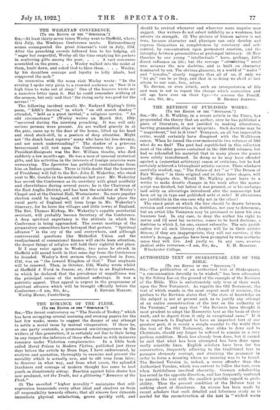THE WESLEYAN CONFERENCE.
[To THE EDITOR or THE " SPECTATOR."] Sra,—At least thirty-seven times Wesley went to Sheffield, where, this July, the Wesleyan Conference meets. Extraordinary scenes accompanied the great itinerant's visit in July, 1786. After the preaching crowds followed him to his lodging, all "eager but respectful, Wesley all the time emptying his pockets in scattering gifts among the poor. . . . A vast concourse
assembled on the green. . Wesley walked into the midst of them, knelt down, and asked God to bless them. . . Wesley, by his dauntless courage and loyalty to lofty ideals, had conquered the mob."
In connexion with the same visit Wesley wrote : " In the evening I spoke very plain to a crowded audience on ' Now it is high time to wake out of sleep.' One of the hearers wrote Me a nameless letter upon it. But he could remember nothing of the sermon, but only said that ' the rising early was good for the nerves! "
Tho following incident recalls Mr. Rudyard Kipling's little poem, " Eddi's Service," in which " an old marsh donkey " attended, " bold as a guest invited," a religious service. " An odd circumstance " (Wesley writes on March 31st, 17641 "occurred during the morning preaching. It was well only serious persons were present. An ass walked gravely in at the gate, came up to the door of the house, lifted up his head and stood stock-still, in a posture of deep attention. Might not ` the dumb beast reprove' many who have far less decency, and not much understanding? " The shadow of a grievous bereavement will rest upon the Conference this year. Its President-Designate was the Rev. William Goudie, who died suddenly a few months ago. He was a man of unusual oratorical gifts, and his activities in the interests of foreign missions were unwearying. The Spectator has published contributions from him on Indian questions. There is little doubt that the honours of Presidency will fall to the Rev. John E. Wakerley, who stood next to Mr. Goudie in the nominations last year. Mr. Wakerley has served the Conference as its secretary with great assiduity and cheerfulness during several years; he is the Chairman of the East Anglia District, and has been the minister at Wesley's Chapel and at the Central Hall, Westminster. No more popular election could be imagined, and if it should take place the rural parts of England will loom large in Mr. Wakerley's itinerary, for he loves the villages and little towns of England. The Rev. Thomas Kirkup, Mr. Wakerley's capable secretarial assistant, will probably become Secretary of the Conference. A deep spiritual expectancy is the attitude in which the Conference is being approached. The recent meetings of the preparatory committees have betrayed that gesture. " Spiritual advance " is the cry of the soul everywhere, and although controversial questions like Methodist Union and the readjustment of connexional finance will excite keen attention, the deeper things of religion will hold their rightful first place.
If I may refer again to Wesley, two notes ho struck in Sheffield will sound forth in that same day from the Conference he founded. Wesley's first sermon there, preached in June, 1742, was on " the inward Kingdom of God." That emphasis will be renewed. Then, in October, 1745, Wesley wrote whilst at Sheffield A Word in Season; or, Advice to an Englishman, in which he declared that the prevalence of ungodliness was the principal cause of the national sufferings. It was a patriotic appeal. That appeal is urgent in the programme of spiritual advance which will be brought officially before the
Wesley Manse, Canterbury.


































 Previous page
Previous page